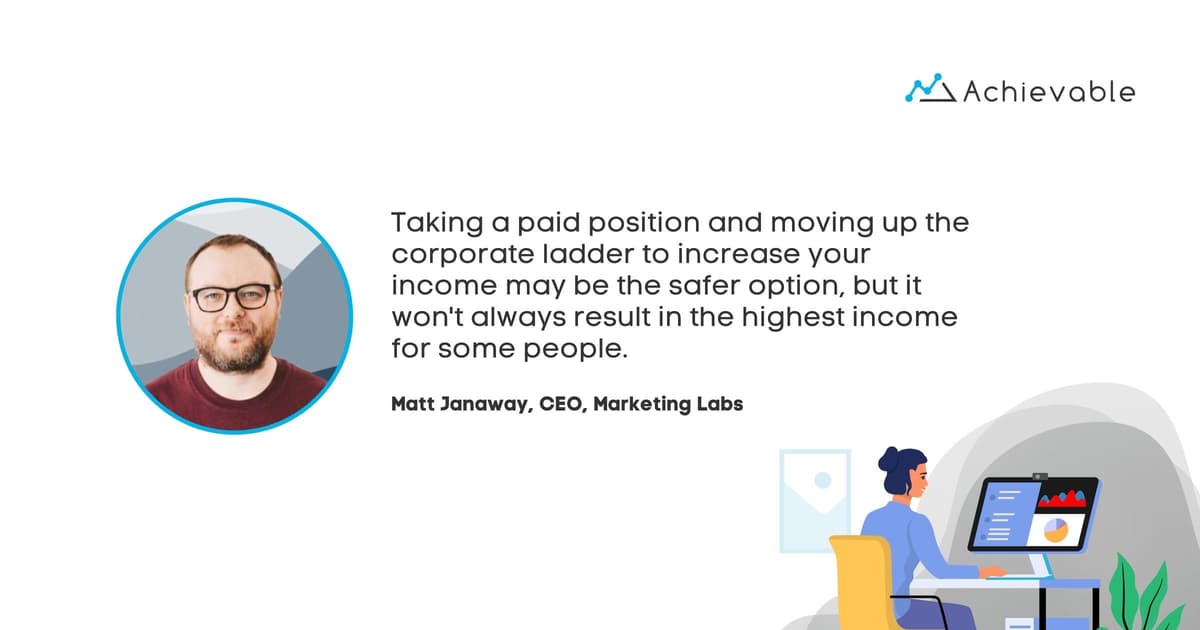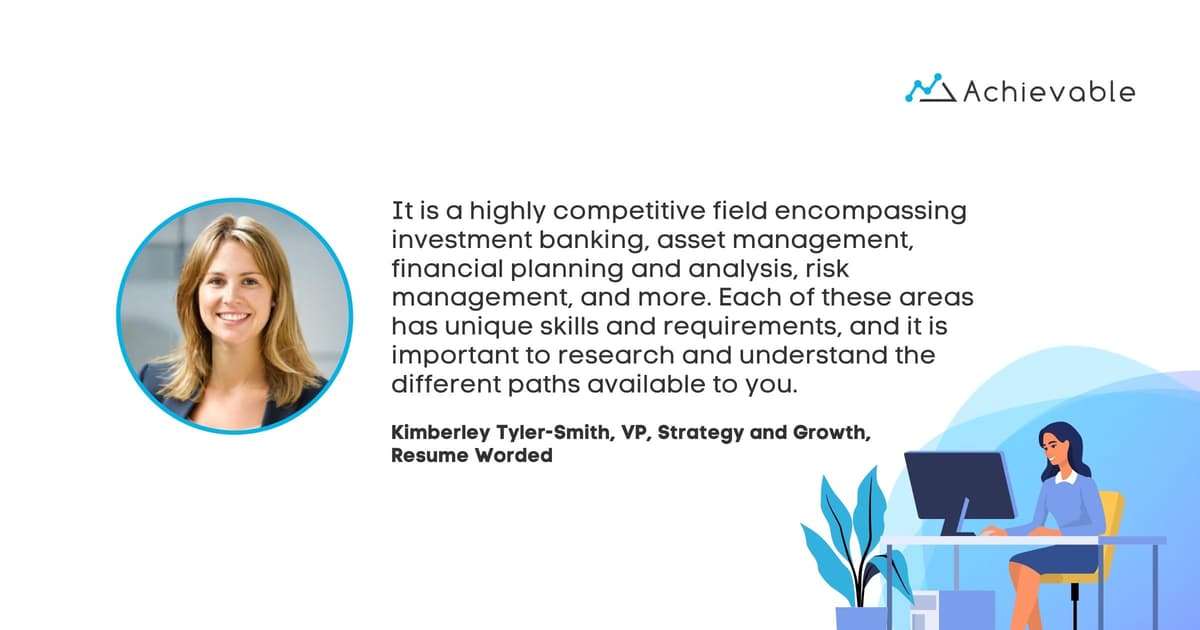
From knowing your limits to having the ability to do tedious work, here are 18 answers to the question, “What should you know before starting a career in finance?”
While the idea of working in finance sounds sexy, just remember that most finance jobs are client services. Whether you’re in investment banking, wealth management, or consulting, the core work may be finance, but you ultimately serve clients.
So just make sure you are good at taking directions and managing expectations. Some people chafe at taking orders and doing others’ bidding.
Clients can be demanding, and you won’t last long if you lose your cool when asked to stay late because a client needs a report or figures for a certain time.

John Ross, CEO, Test Prep Insight
To have a successful career in finance, you must be able to develop new businesses and attract clients; therefore, building a strong professional network is essential. Making time to attend industry events, joining professional organizations, and connecting with peers and mentors will help you build types of relationships that can open doors to new opportunities.
A strong network will also help you learn about job opportunities that are not always publicly advertised, so knowing the right people can help you stand out from other applicants.
Networking also connects you with investors and financial institutions who can help you access the capital you need to support your business.

Anthony Martin, Founder and CEO, Choice Mutual
While you don’t need to be an algebra wizard, having the ability to quickly and accurately perform calculations, such as addition, subtraction, multiplication, and division, is key.
Understanding basic concepts like compound interest and rates of return are also necessary for this industry. With this skill set, working with numbers becomes easier, and managing financial investments becomes second nature.

Lorien Strydom, Executive Country Manager, Financer.com
Some jobs in the financial sector pay you based on how well you work instead of guaranteed pay. If your efforts are effective, I think you could gain significantly.
Many commission-based jobs in this industry don’t have a cap on how much money they can make. Your revenue level could, however, fall if your efforts are unsuccessful or if the industry or economy experiences a downturn.
Taking a paid position and moving up the corporate ladder to increase your income may be the safer option, but it won’t always result in the highest income for some people.
Matt Janaway, CEO, Marketing Labs

Money is an incredibly personal thing. In finance, it’s easy to get swept up in statistics and data, but there are emotional and personal reasons behind financial decisions.
Your clients won’t be able to decide based on numbers alone, so developing a sense of empathy and understanding and applying it to every client’s situation will help you find the best options for their needs.
It may not end up being the highest return or the choice you would have made, but knowing the compromises that will serve clients will bring you more long-term success.

Gates Little, President and CEO, altLINE
Before pursuing a full career in finance, you must have a strong subject foundation and meaningful work experience. Look for internship opportunities to help you gain practical knowledge about finance-related roles.
Or you can engage with a financial coach to gain more guidance on the vital aspects of this profession. Keep in mind that work experience will give you an edge when applying for a job.
Of course, on top of your well-crafted resume showcasing your educational background and competence in the field.

Allan Stolc, Founder, Bankly
Most graduates think that if they earn a four-year degree and do an internship, they’ll land their dream job. And while this is a good starting point, if you want the best jobs with the highest growth potential, you’ll need to prioritize building a personal brand.
This means attending networking events, developing long-lasting friendships with people in your industry, and creating a personal website and LinkedIn account that stands out. This will allow you to establish connections with hiring managers, CFOs, recruiters, and other industry leaders.
These connections will give you more power and options when negotiating for promotions. If your current employer isn’t giving you growth opportunities, you can use your connections to land another job.

Scott Lieberman, Owner, Touchdown Money
Knowing how a firm operates from the inside and how financial choices can affect a company’s overall success or failure are examples of having excellent business acumen.
Those with great business sense may make wise financial decisions that support a company’s long-term growth and success.
Attending business classes, working with a mentor in the finance sector, and achieving experience through internships or positions in finance are a few strategies to improve your business acumen.
The financial industry offers a profitable career path, but it causes knowledge of the market’s operations. To avoid falling behind, it’s also critical to keep up with current affairs and financial industry developments.
There is a lot on the line for individuals who work in the intricate sector of finance. When you don’t grasp the fundamentals, it’s too easy to make costly errors that have an adverse effect on your career.

Joe Li, Managing Director, CheckYa
Finance is a heavily regulated industry, and its laws change frequently. Understanding and complying with them is crucial for success in the field, as violations can cause significant legal and financial consequences for individuals and organizations.
And once the person finds employment, knowing what financial rules prevail in a company is essential. Staying up-to-date with laws and regulations should be based on seeking information about new rules and laws and actively integrating this knowledge into their work.
Individuals may also read industry publications and news articles, take part in professional development courses, or attend training programs.

Nina Paczka, Community Manager, Resume Now
The most important thing to consider before starting a career in finance is your credentials. You will need to gain certain professional certifications, licenses, and college degrees before entering the finance world.
Without these credentials, there is no chance for you to start a career in finance. However, they can differ for each type of role in the financial industry. For example, to pursue a career in accounting, you will need to be aware of tax and corporate laws.

Spencer Reese, CEO, Military Money Manual
You can attain entry-level positions in the financial sector with merely a high school diploma. A high school graduate may be qualified for a position as a bookkeeper at some companies.
However, a bachelor’s degree or above is typically required for even entry-level finance professions. Many entry-level financial jobs pay competitively well, sometimes exceeding the average salary range for a bachelor’s graduate.
The starting salary for certain bachelor’s degree occupations is considerably over $60,000. However, experience alone is usually not enough if you want to ascend the career ladder and work at the managerial or executive level. In the financial sector, upper-level professionals have an MBA or a similar advanced degree.

Timothy Allen, Sr. Corporate Investigator, Corporate Investigation Consulting
One of the most important things you should know before starting a career in finance is that finance is a vast and diverse field. There are many careers within it, and each one will require a unique set of skills.
It is a highly competitive field encompassing investment banking, asset management, financial planning and analysis, risk management, and more. Each of these areas has unique skills and requirements, and it is important to research and understand the different paths available to you.
Some roles may require specialized certifications or degrees, while others may require specific software or technical expertise. It is also essential to be aware of the changing industry trends and developments, as well as the growing regulatory environment.
By taking the time to weigh your strengths, interests, and goals, you can select a career path in finance that is right for you.
Kimberley Tyler-Smith, VP, Strategy and Growth, Resume Worded

Creating a computational formula for a financial issue is called financial modeling. This might be anything from the expected future performance of a business to the intended outcomes of a potential investment.
Investors, bankers, and other members of the finance industry use financial models to help make well-informed decisions about how to deploy their capital. Knowing how to create these models is a requirement if you want a career in finance.
The software might make the process easier, but you must have a solid grasp of the fundamentals of accounting and finance. You’ll be able to develop precise models that will aid in the decision-making of both you and your colleagues.

Leona Bass, Marketing Director, LoanAdvisor
There will always be an element of risk when making investment decisions and financial strategies. Rather than fearing the outcome, try to get comfortable taking risks and understand the potential rewards and losses that may result from your decisions.
From stock market investments to portfolio diversification, having a solid understanding of the risks involved can help you make informed decisions and make the most of your financial endeavors.
Risk management is not only essential for successful financial planning, but it is also a valuable skill that can make you an attractive asset to potential employers.

Gary Gray, CFO, CouponChief
While analytical and problem-solving skills are a must in the financial industry, one should also note that proficiency in interpersonal skills will bode well in a finance position.
Your degree is important, yes, but if you’re looking for a job in finance, you need to bring more to the table than a degree. Think of it this way: if a degree is a requirement of the job, then if you only display your degree as your qualifications, you will not stand apart from the crowd.
It is imperative that you bring interpersonal skills to the table to supplement that. You’ll often learn the fine details of the position on the job, but employers cannot teach you attitude, nor can they teach you how to interact with others.
This is up to you to show a prospective employer that you have an excellent attitude and outstanding interpersonal skills. Take the time to highlight communication and collaboration skills on your resume, as this will look unique to others.

David Lewis, CEO and Founder, Monegenix
The financial industry is very dynamic. New products, regulations, and technologies are constantly being developed, so lifelong learning is important to keep up with the latest developments and ensure that your knowledge and skills remain relevant.
Whether through formal education, professional development programs, or self-study, continuous learning is an investment for a career in finance. The finance industry is highly competitive, and success often depends on your ability to improve your skills and knowledge continuously.
For instance, the rise of technology has revolutionized the way we deliver financial services, leading to new products and services, such as digital wealth management, robo-advisory, and blockchain-based financial instruments. If you are not aware of these recent developments, even if you have expertise in traditional financial concepts, you have less chance of succeeding in today’s financial sector.

Jonathan Merry, Founder, Moneyzine
You must know the drawbacks of a finance career before starting one. No industry is perfect, and a few downsides may affect you more than others, while some may encourage you to enter this career path to fuel your personal growth and development.
The finance industry is highly competitive and stressful, putting you in critical decision-making scenarios that give you immense pressure. It can also be time-consuming to spend hours analyzing numbers and preparing reports that don’t promote a healthy work-life balance.
Knowing these disadvantages can help you decide whether a finance career is best for you, your skill sets, and the demands you’re willing to take on.

Grant Polachek, Head of Branding, Squadhelp
It may seem counterintuitive to argue that these jobs are monotonous given how stressful they may be. However, you can do the same tasks every day in most of these roles.
Even if the clients or customers vary, I believe you might still crunch the same data, discuss the same services, and do other things every day.
Your schedule might vary a little; however, some people might find it dull and uninteresting to go to the same office every day and complete the same responsibilities.

Kim Leary, Creative Director, Squibble

Want to work in finance but don’t know where to start?We walk you through the two main ‘sides’ of finance, the buy side and the sell side, as well as which roles fall into each category and what kind of work they entail. Brandon Rith shares his knowledge of Investment Banking (IB), Private Equity (PE), asset management firms, and hedge funds.

Interested in careers in finance? In this post, we walk you through the different career paths in finance and securities to help you decide where you want to go.

A complete walkthrough of how to get sponsorship for Series 7 licensing, including what sponsorship means, how to apply, Form U4, and what to do if you can’t get sponsored.